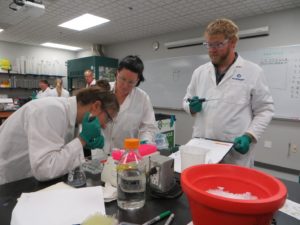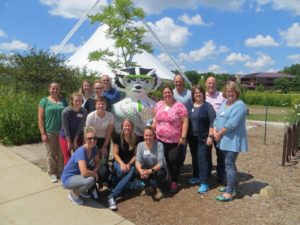 Significant resources are required to deliver high-quality science experiences for students and their teachers. In addition to generous amounts of staff time, for both preparation and program delivery, often there are costly lab supplies. Access to a well-equipped laboratory designed to facilitate educational experiences is also important.
Significant resources are required to deliver high-quality science experiences for students and their teachers. In addition to generous amounts of staff time, for both preparation and program delivery, often there are costly lab supplies. Access to a well-equipped laboratory designed to facilitate educational experiences is also important.
Of course, hands-on experiences are related to learning: for example, becoming scientifically literate, meeting science standards, preparing for AP tests. That said, many of us involved in science outreach activities will tell you that perhaps the most significant justification for these investments is that you never know when one of the students will experience that ‘Aha!’ moment which proves to be life-changing for them.
Over the years, we have heard many testimonials from students, teachers, school-to-career coordinators and other school district personnel, mentors and parents that speak to this experience. There just seems to be something about getting into the lab and engaging directly in “doing science” that stays with some participants as they head back to school, continue with their studies and on to their careers.
At the BTC Institute, we play a limited role in all of this. Biotechnology Field Trip participants may be with us for as little as 90 minutes; A Celebration of Life elementary and middle school students are here summer mornings for two weeks; our Camp Biotech 9th and 10th graders attend full days for just a week. High school students enrolled in Biotechnology in the World of Medicine come one night a week for one semester. By far, those most immersed are the juniors and senior enrolled in the Dane Country Biotechnology Youth Apprenticeship Program – they are here for a class on Wednesday evenings throughout the school year and are also employed in an academic or industry lab, where they total 450 work hours/year.
So, we think our programs matter, but what really matters are science teachers, and, behind them, the support that each school district can provide for the teaching of science, for school budgets overall. And, we circle back to our initial topic of resources.
 This summer, we offered three courses for teachers:
This summer, we offered three courses for teachers:
- Biotechnology: The Basics for Middle School Teachers (July 9-11, 2018)
- Biotechnology: The Basics (July 16-20, 2018)
- Biotechnology: Beyond the Basics (July 23-27, 2018)
More than 30 teachers from across the country joined us for one or more sessions. They immersed themselves in the challenges associated with building better experiences for their students. The closing session of each course consisted of each teacher sharing specific ideas that he/she will incorporate into classes this coming year.
With this blog in mind, I asked them to share their thoughts regarding two very basic questions. Here are the questions and a selection of responses:
- What are the biggest challenges you face in trying to provide meaningful science experiences for your students?
The biggest challenge is focusing on what’s most important, which is inspiring students to participate in real science which is often messy, filled with mistakes, and controlled chaos. It is NOT teaching every objective, standardized testing, or uniform teaching and learning.
Karyn Medendorp, Comstock STEM Academy Teacher, Kalamazoo, MI
Access to equipment is a big constraint. Costs of equipment and especially consumables are going up much faster than our budget, which are stagnant or shrinking. Teacher training in content area is not supported by our district (both time and money has been cut/eliminated). It’s getting extremely difficult to attend conferences like NSTA, NABT, etc.
Judith C. Weiss, Science/Engineering Teacher, Whitefish Bay High School, Whitefish Bay, WI
Obtaining resources and appropriate science equipment and serving 160 students.
Michelle Ann Young, Reading/Science/PLTW Teacher, Rufus King International Middle School, Milwaukee, WI
The greatest challenge I find is making my students do meaningful experiments that can enrich their learning. Another challenge is the cost of equipment. If I can borrow from lending libraries that would be awesome.
anonymous; middle school teacher
Thanks again for a wonderful PD experience. As far as challenges go, the biggest issue for me so far has been having the time to put biotechnology into my class with all the standards that must be taught. Fortunately now I will have a Biotechnology class which enables me to take the time to teach what I want to. The other challenge is always money. These labs add up and the base equipment is not cheap either. Once I get established though the price will be manageable.
Tamara Pennington, AP Bio Teacher, Windsor High School, Windsor, CO
- What types of support from employees working in the biotech industry are (or would be) most helpful to you?
Employees in the biotech industry can help the most by networking with a teacher and supporting that teacher each year in whatever that teacher needs. It could be coming into the classroom to give students real feedback on projects, funding for supplies (most of what the biotech industry considers unusable materials would be a goldmine for a teacher), and helping us see how what we do “looks” in the real world. Ask “How can I help?” rather than volunteer to lecture the classroom. Students need less lecturing and more time to explore their own ideas.
Karyn Medendorp, Comstock STEM Academy Teacher, Kalamazoo, MIThe type of training provided by BTCI is extremely valuable. I am hoping to attend future courses. Equipment loans and/or donations of consumables would be extremely helpful. Field trips to biotech firms would also be appreciated. Sometimes taking students outside of school is difficult, so having visiting professionals to conduct lab activities in the classroom or present research would be great. Teacher summer lab opportunities would be great. Judith C. Weiss, Science/Engineering Teacher, Whitefish Bay High School, Whitefish Bay, WI
The summer workshop was awesome and workshops like that will definitely help teachers implement new technologies in classroom learning. If we could borrow materials every year that would be great. We would love for any scientist working in biotechnology to Skype my students once a year after the implementation of technology in DNA separation etc in my classroom. This way the students can have more insight into future careers in that field and also have their questions answered. anonymous middle school teacher
Visitation to the biotech lab and/or your representatives visiting my school for demonstration/labs. Michelle Ann Young, Reading/Science/PLTW Teacher, Rufus King International Middle School, Milwaukee, WI
Support can come in the form of discounted expendables (like Promega offers), providing used equipment, and time and resources for this in this industry to work with students who are interested in Biotech as a potential career. I am truly hoping to pair with a biotech company in Colorado to do these things with my students.Tamara Pennington, AP Bio Teacher, Windsor High School, Windsor, CO
